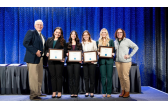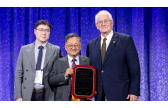
Each year, AIChE’s Society for Biological Engineering (SBE) honors individuals whose work is transforming biotechnology, biochemical engineering, and the broader life sciences. The 2025 honorees — Daniel G. Anderson, Karmella A. Haynes, and Costas D. Maranas — reflect the depth and diversity of today’s biological engineering community. Through their research and leadership, they continue the legacy of SBE’s founders while shaping the next chapter of the field.
Their awards will be formally presented at AIChE’s Annual Meeting, where their talks will highlight not only groundbreaking research but also the collaborative and inclusive vision driving the next generation of biological engineers.
To learn more about their journeys, research, and outlook on the future of biotechnology, we spoke with this year’s SBE award recipients.
James E. Bailey Award
Recipient: Daniel G. Anderson, Joseph R. Mares (1924) Professor of Chemical Engineering, Massachusetts Institute of Technology
Tell us a little about yourself and your work.
I received a BA in mathematics and biology from the University of California, Santa Cruz, in 1992, and a PhD in molecular genetics from UC Davis in 1997. I am currently the Joseph R. Mares (1924) Professor of Chemical Engineering, a core member of the Institute for Medical Engineering and Science, and an intramural member of the Koch Institute for Integrative Cancer Research at MIT.
We are broadly interested in developing new medical technologies and human therapies. One particularly important challenge is delivering drugs inside target cells in the body. Many macromolecular drugs, including DNA, RNA, and certain proteins, have great therapeutic potential but only function inside a cell. Using both rational design and combinatorial methods, we have developed synthetic nanoparticles that act like artificial viruses, delivering genetic therapies in vivo to selectively turn genes off, turn them on, or even permanently edit the genome.
What does it mean to receive an award honoring James E. Bailey?
James E. Bailey was a pioneer in biotechnology, and it is a great honor to receive this award. He was one of the leaders in biochemical engineering and played a pivotal role in establishing this field.
What are you most excited about in the years ahead?
I am particularly excited by work at the intersection of chemistry, materials, and biology. We are making great strides in developing new ways to control and engineer biological systems, and I believe these approaches will profoundly impact society, particularly in creating new methods to treat disease.
June C. Wispelwey Bio Leadership Fellowship
Recipient: Karmella A. Haynes, Assistant Professor, Wallace H. Coulter Department of Biomedical Engineering, Emory University
Tell us about your background and research.
I am originally from St. Louis, MO, and a first-generation PhD graduate. My parents were in gifted programs but struggled to thrive in an environment of discrimination. So, they were especially motivated to support my pursuit of science and higher education. I was drawn to mathematics, but genetics captured my attention once I realized patterns were involved. My training in molecular genetics, epigenetics, bioinformatics, and synthetic biology all converged on the research program I lead today: epigenetic control systems engineering.
My group uses innovative approaches to manipulate chromatin in human cells, which is a core component of epigenetics and cell state determination. The scope of our Epigenetic Control Systems Engineering work includes designing and deploying rationally designed chromatin proteins (our founding work) and noncoding RNAs to rewire gene expression programs, using genetically encoded reporters to track changes in epigenetic states in living cells, and controlling the location of chromatin-modifying enzymes to enhance biomedically useful functions.
What does this recognition mean to you?
I believe in supporting brilliant thinkers who are denied opportunities because of societal politics such as racism; that belief motivated me to launch AfroBiotech. The world benefits from unique ideas that are often sidelined. What starts as an effort to address health and research disparities can ultimately benefit society as a whole by generating new knowledge and fulfilling the promise of "generalizability" that many technologies fail to meet. I am deeply moved to have this work recognized by The Wispelwey Award, being named for a dynamo like June Wispelwey who was SBE's first Director, CEO of AIChE, and launched the FOSSI initiative with HBCUs (I am an HBCU alum myself).
What are you excited about for the future of the field and SBE?
I am excited about the potential and trajectory of biotechnology. From a big picture perspective, cellular and biomolecular systems are gaining traction in multiple sectors, from medicine, to food, to materials. As long as inclusive practices in training and collaboration continue, we are more likely to tap into the best and brightest minds, and maximize return on the investments we have made so far in research and tech development.
D.I.C. Wang Award for Excellence in Biochemical Engineering
Recipient: Costas D. Maranas, Waltemeyer Endowed Chair in Chemical Engineering, Penn State University
Tell us a little about yourself and your work.
I grew up and went to school in Thessaloniki, Greece. I was hoping to become a basketball player, but I had to settle for chemical engineering. When I am not working, I enjoy travel, running, mountain climbing, and scuba diving.
Originally, my research was focused on process systems engineering and optimization. For the last couple of decades, we have been leveraging computations to uncover biological insights and develop re-engineering strategies for metabolic networks and proteins. In the past few years, we have explored ways to integrate algorithmic techniques with newly emerging AI tools.
What does this recognition mean to you?
It is truly humbling to be bestowed this award by my peers. D.I.C. Wang was a true pioneer in many scientific fields and a founder of new industries — from food processing and biomass conversion to animal cell culture and biotherapeutics manufacturing.
What excites you most about the field’s future?
I am optimistic about the future of SBE and biochemical engineering. As a community, we have a strong track record of rapidly adopting breakthrough technologies to solve important societal challenges, including the discovery of new bioactive molecules and the development of biochemical solutions for materials and energy.








